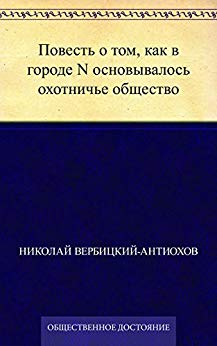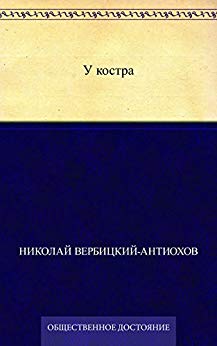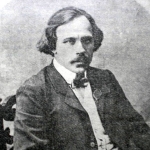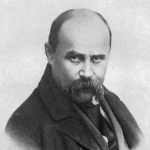Background
Nikolai Andreevich Verbitsky-Antiohov was born on February 13, 1843, in Chernihiv, Chernihivs'ka Oblast', Ukraine into a noble family. His mother descended from the Golitsyn family.


(Russian edition)
Russian edition
https://www.amazon.com/%D0%9F%D0%BE%D0%B2%D0%B5%D1%81%D1%82%D1%8C-%D0%BE%D1%81%D0%BD%D0%BE%D0%B2%D1%8B%D0%B2%D0%B0%D0%BB%D0%BE%D1%81%D1%8C-%D0%BE%D1%85%D0%BE%D1%82%D0%BD%D0%B8%D1%87%D1%8C%D0%B5-%D0%BE%D0%B1%D1%89%D0%B5%D1%81%D1%82%D0%B2%D0%BE-Russian-ebook/dp/B00N10R5DQ/ref=sr_1_1?qid=1582801380&refinements=p_27%3A%D0%9D%D0%B8%D0%BA%D0%BE%D0%BB%D0%B0%D0%B9+%D0%92%D0%B5%D1%80%D0%B1%D0%B8%D1%86%D0%BA%D0%B8%D0%B9-%D0%90%D0%BD%D1%82%D0%B8%D0%BE%D1%85%D0%BE%D0%B2&s=digital-text&sr=1-1&text=%D0%9D%D0%B8%D0%BA%D0%BE%D0%BB%D0%B0%D0%B9+%D0%92%D0%B5%D1%80%D0%B1%D0%B8%D1%86%D0%BA%D0%B8%D0%B9-%D0%90%D0%BD%D1%82%D0%B8%D0%BE%D1%85%D0%BE%D0%B2

(Russian edition)
Russian edition
https://www.amazon.com/%D0%A3-%D0%BA%D0%BE%D1%81%D1%82%D1%80%D0%B0-Russian-%D0%9D%D0%B8%D0%BA%D0%BE%D0%BB%D0%B0%D0%B9-%D0%92%D0%B5%D1%80%D0%B1%D0%B8%D1%86%D0%BA%D0%B8%D0%B9-%D0%90%D0%BD%D1%82%D0%B8%D0%BE%D1%85%D0%BE%D0%B2-ebook/dp/B00N10R55Y/ref=sr_1_2?qid=1582801380&refinements=p_27%3A%D0%9D%D0%B8%D0%BA%D0%BE%D0%BB%D0%B0%D0%B9+%D0%92%D0%B5%D1%80%D0%B1%D0%B8%D1%86%D0%BA%D0%B8%D0%B9-%D0%90%D0%BD%D1%82%D0%B8%D0%BE%D1%85%D0%BE%D0%B2&s=digital-text&sr=1-2&text=%D0%9D%D0%B8%D0%BA%D0%BE%D0%BB%D0%B0%D0%B9+%D0%92%D0%B5%D1%80%D0%B1%D0%B8%D1%86%D0%BA%D0%B8%D0%B9-%D0%90%D0%BD%D1%82%D0%B8%D0%BE%D1%85%D0%BE%D0%B2
Nikolai Andreevich Verbitsky-Antiohov was born on February 13, 1843, in Chernihiv, Chernihivs'ka Oblast', Ukraine into a noble family. His mother descended from the Golitsyn family.
Nikolai Andreevich moved regularly due to his father's work and lived in Volyn and in Poltava. In Poltava, he studied with Mykhailo Starytsky, with whom he became friends. Through Starytsky, Nikolai Andreevich met and struck up a lifelong friendship with his brother, Mykola Lysenko. Under the influence of Athanasius Markovich, who lived in the neighborhood, Nikolai Andreevich took a great interest in Ukrainian culture.
Nikolai Andreevich graduated from the Chernihiv Gymnasium, where he was friends with G.I. Uspensky. In 1859, he entered Kiev University, and a year later, he transferred to Saint Petersburg University. In 1861, at the university’s closure, he was expelled to Kiev for participating in the student movement. According to other sources, Nikolai Andreevich was taken to Saint Petersburg by his father. In Saint Petersburg, he lived in the house of the university classmate of the father of the architect A.I. Stackenschneider. Taras Shevchenko lived nearby, in the house of the Academy of Arts. He often went to Verbitsky’s place for a cup of tea. Nikolai Andreevich took an external degree of the Kiev University in 1864.
After graduating in 1864, Nikolai Andreevich was appointed a teacher of Russian literature at the Poltava Gymnasium. Verbitsky’s superiors were displeased with his behavior and that served as the reason for transfers from one gymnasium to another. He was sent to Chernihiv in 1866, to Ryazan in 1875, and to Orel in 1886. He also held secret meetings and enjoyed great popularity both because of his talent and his companionship with the students. In 1900, Nikolai Andreevich was dismissed by request and sent to his homeland, Chernihiv. He stayed in touch with many Ukrainian writers and public figures, namely L.I. Glebov, V.N. Zabilaya, P.A. Kulish, V. B. Antonovich, and others.
Nikolai Andreevich began writing as a gymnasium student. His first poems in Ukrainian were published under the pseudonym M. Bilokopitiy in the magazines Osnova and Chernigovskiy Listok. Verbitsky's poems, marked by the influence of T.G. Shevchenko, condemned national and social oppression and were published in Ukrainian anthologies (Vіk, Ukrainskaya Muza), as well as in the almanac Streams of Life published by M.M. Kotsyubinsky. In the poem Modern Trends in Ukrainophilism (1908) the fact of writing the lyrics for the Ukrainian Anthem Shche ne Vmerla Ukrayina together with P.P. Chubinsky was mentioned.
In 1876, Nikolai Andreevich was invited by P.A. Gaideburov to collaborate in the Nedelya newspaper. He was published in the Knizhki Nedeli magazine, in which he published an autobiographical novel The Educator. It depicted the conflict between a freethinking teacher and a conservative gymnasium. He was also published in the Rossiya magazine, in the provincial press (Kiyevskiy Telegraf, Orylovskiye Vedomosti, and others) and in the magazines, such as Zhurnal okhoty, Priroda i Okhota, Psovaya i Ruzheynaya Okhota and many more.
Verbitsky’s short stories, which compiled his first collections Essays on the Hunting Life and Hunting Stories (1900), were distinguished by the clearness of landscape and portrait sketches. The second collection Essays from a Hunting Life was diverse in composition: along with stories in which the ironic image of provincial life sometimes possessed some grotesque features, it included some poems in Russian. Verbitsky’s Essays on School Life. Inspector (1910) were posthumously published.
(Russian edition)
(Russian edition)
Nikolai Andreevich was known for his nationalist inclinations which were reflected in his poetry.
In his student years, Nikolai Andreevich was a member of the Stara Gromada"Society. It was an organization of the Ukrainian intelligentsia in Kiev, which was engaged in social, cultural, and educational activities. It operated from 1859 to 1876, when it was banned by the Ems Decree.
Nikolai Andreevich enjoyed great popularity both because of his talent and his companionship with the students. Some of his students noted Verbitsky's amazing memory and education.
Nikolai Andreevich was married to Ekaterina Fedorovna Verbitskaya-Antiohova. The couple had six children: Fedor, Maria, Nikolai, Grigory, Vera, and Olga. Olga was exiled to Eastern Siberia in 1903 as involved in the activities of the Social Revolutionaries.
The poet’s son-in-law was Mykola Vorony, a prose writer, translator, poet, literary critic, actor, and theater expert. His grandson was the poet Mark Vorony.

Sergei Pavlovich Golitsyn was the Chernihiv Governor-General in 1862-1870.

